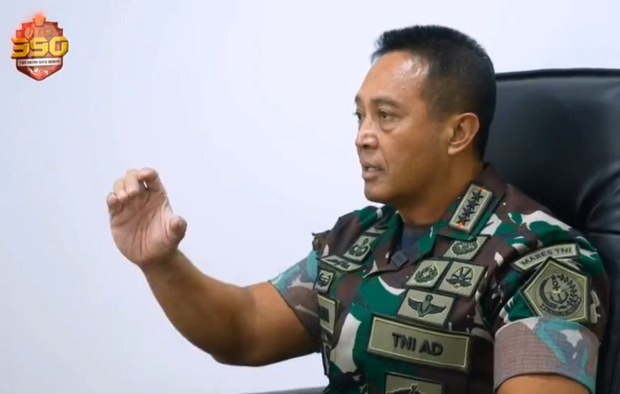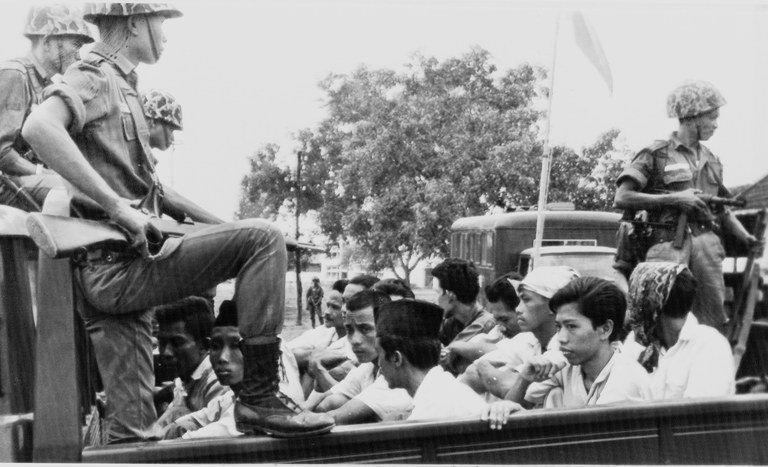Indonesian military chief calls for descendants of communists to join armed forces
2022.03.31
Jakarta
 Gen. Andika Perkasa discusses allowing descendants of the defunct Indonesian Communist Party to join the military, March 30, 2022.
Gen. Andika Perkasa discusses allowing descendants of the defunct Indonesian Communist Party to join the military, March 30, 2022.
Human rights activists on Thursday praised the Indonesian military chief’s decision to allow relatives and descendants of the country’s liquidated communist party to join the armed forces, calling it a right step toward ending long-standing discrimination.
On Wednesday, Gen. Andika Perkasa said there were no strong legal grounds to ban descendants of Communist Party of Indonesia (PKI) members, who were blamed for a failed coup that ignited an anti-communist bloodbath in Southeast Asia’s largest country in 1965-66, during which the military played a leading role.
“What is the legal basis for this? What have they violated? Please don’t make things up. I am a law-abiding person. If we ban them, make sure we have a legal basis,” Indonesia’s top military commander said.
During the rule of President Suharto, children and relatives of those linked to the communist party were stigmatized and barred from joining the military and the police force, or getting civil service jobs. The country’s longtime dictator, a former army general, came to power in 1967 when he took over from Sukarno, the country’s founding president, after the mass killings targeting suspected PKI members.
“This should be an opportunity for national political reconciliation to end the stigma and discrimination against PKI descendants,” said Ardi Manto Adiputra, deputy director of the human rights group Imparsial.
Ardi said that the specter of communism has been used to attack political opponents and to attract voters during elections.
Human Rights Watch researcher Andreas Harsono supported Andika’s action.
“That is very good because it reminds us that the [decree] does not prohibit the descendants of the PKI from serving this country,” Andreas told BenarNews.
“In fact, there is no legal basis that prohibits the descendants of communists from working for the country,” he said.
Historians said more than 500,000 were killed in a purge targeting members and sympathizers of the PKI after a failed coup in 1965 blamed on communists. The government has suppressed alternative accounts of the events and public discussions on that chapter in the country’s history were often banned.
Ilham Aidit, son of the late PKI chairman D.N. Aidit, told BenarNews in 2016 he had failed to become a civil servant because of his father’s supposed sins.
“The anti-communist propaganda by [President Suharto’s] New Order was overwhelming. It really stuck into a lot of people’s minds, generated hatred for those who don’t even know anything, and it still exists,” he said at the time. His father was executed during the 1965-66 crackdown against the communists.

General dropped virginity tests
Andika made headlines last year after he issued a directive to stop subjecting female recruits to so-called virginity tests. The general also was praised for supporting military member and volleyball athlete Aprilio Manganang, who competed as a woman but transitioned to be a man.
Women make up about 15 percent of the roughly 800,000 members of the military in Southeast’s Asia largest country.
Andreas said Andika’s latest stance should be supported, although it would not necessarily end all forms of discrimination against relatives of PKI members.
“We won’t end the stigma overnight. But if you want to move forward, General Andika’s statement must be supported,” Andreas said.
Pipit Ambarmirah, a daughter of a former PKI political prisoner, called Andika’s remarks progress.
“It’s good if he thinks like that,” she told BBC Indonesia.
Despite Andika’s decision to welcome communist party descendants, a 2021 survey indicated that 46.6 percent of Indonesians believed there could be a PKI resurgence, citing among others, the influx of Chinese workers in the country as evidence.
Indonesian human rights advocates, meanwhile, have lobbied the government to pursue a national reconciliation over what happened in 1965-66, although President Joko “Jokowi” Widodo has said that his administration would not apologize.
In 2018, a land rights activist was sentenced to 10 month in prison after he was found guilty of spreading communism for unfurling a banner displaying a hammer and sickle during a protest against a mining operation in East Java province.
A higher court later increased his prison term to four years.
Rights group Amnesty International said there was no evidence that Hari Budiawan, also known as Budi Pego, had displayed a pro-communist banner.







